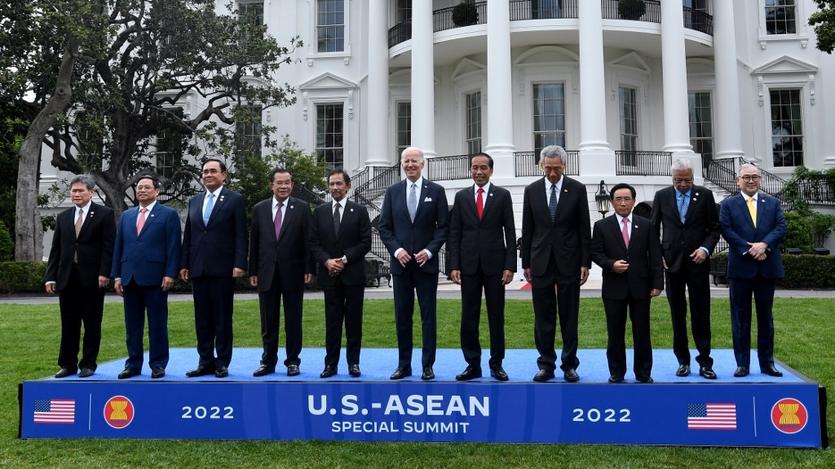 US President Joe Biden (center) and leaders from the Association of Southeast Asian Nations (ASEAN) pose for a group photo on the South Lawn of the White House in Washington, DC, May 12, 2022. (NICHOLAS KAMM / AFP)
US President Joe Biden (center) and leaders from the Association of Southeast Asian Nations (ASEAN) pose for a group photo on the South Lawn of the White House in Washington, DC, May 12, 2022. (NICHOLAS KAMM / AFP)
The special summit between the United States and the Association of Southeast Asian Nations aims at upgrading ties between the two sides but this is unlikely to alter ASEAN’s long-held adherence to the policy of non-alignment and neutrality in international relations, analysts said.
The two-day summit in Washington ended on May 13 with the two sides committing to the establishment of an ASEAN-US Comprehensive Strategic Partnership that is “meaningful, substantive, and mutually beneficial” on the 10th ASEAN-US Summit in November. This is also in line with the commemoration of the 45th anniversary of ASEAN-US Dialogue Relations.
READ MORE: US summit won't sway ASEAN centrality, say analysts
US President Joe Biden pledged $150 million to finance various programs in the region including the promotion of clean energy, cultural exchanges, maritime cooperation and supporting community-based health capacity.
ASEAN centrality and non-alignment would pretty much remain the same even after the ASEAN-US summit,” said Oh Ei Sun, senior fellow at the Singapore Institute of International Affairs. Oh said that ASEAN will continue to rely on both the US and China for security and economic concerns
The summit has served as “a venue for improved ties and cooperation” between ASEAN and US, according to Michael Ricafort, chief economist at the Manila-based Rizal Commercial Banking Corp.
Ricafort told China Daily that it’s “normal for ASEAN to have various arrangements to improve trade, investments (and) security,” in the region, noting that this won’t in any way affect ASEAN’s stance on non-alignment.
The ASEAN-US Comprehensive Strategic Partnership is just the latest of the several international agreements that the ASEAN has signed to support regional economy and security. In 2021, the regional bloc has also committed to a strategic partnership with both Australia and China.
“ASEAN centrality and non-alignment would pretty much remain the same even after the ASEAN-US summit,” said Oh Ei Sun, senior fellow at the Singapore Institute of International Affairs. Oh said that ASEAN will continue to rely on both the US and China for security and economic concerns.
Oh cited some programs that will be launched after the summit. In terms of maritime cooperation, he doesn’t see the US pledging commitments or investing substantial resources in the region. The educational cooperation will just expand the existing US-ASEAN exchange programs.
“You do not see a lot of new US investment or trade initiatives to have with ASEAN primarily because…the US doesn’t have a lot of state-owned companies so (the US government) could not mobilize these state-owned companies to make those investments. (It would) depend on the private enterprise whether it finds ASEAN to be an attractive location,” Oh said.
Compared with the about $40 billion aid package that the US congress has approved for Ukraine, the $150 million that Biden promised for ASEAN is quite small. But Oh noted that Southeast Asia is one of the world’s fastest growing regional economies and as such the US “sees no need to commit more resources” in ASEAN.
ALSO READ: ASEAN foreign chiefs confront key issues
In her April 16 briefing, US Press Secretary Jen Psaki announced the holding of the special summit, noting that the event will demonstrate the US’ “enduring commitment to ASEAN, recognizing its central role in delivering sustainable solutions to the region’s most pressing challenges”. Psaki said that it’s the top priority for the incumbent administration “to serve as a strong, reliable partner in Southeast Asia”.
Punchada Sirivunnabood, associate professor at the Faculty of Social Sciences and Humanities in the Bangkok-based Mahidol University, said that the summit may be one way for the Biden’s administration to drum up support for the Indo-Pacific outlook. But she noted that in dealing with ASEAN, one should also look closely on how one individual member-country deal with either the US or China.
“If you look at this relationship, you have to look at the bilateral (ties) because each (ASEAN) member country has its own policy with the US and China,” Punchada told China Daily.
Filomeno Sta. Ana III, coordinator of the Manila-based think tank Action for Economic Reforms, said ASEAN’s view of non-alignment is “notional”, adding that any position of ASEAN with regards to the US and China will be based on “regional interest” and this regional interest “represents the various national interests” of ASEAN members.


